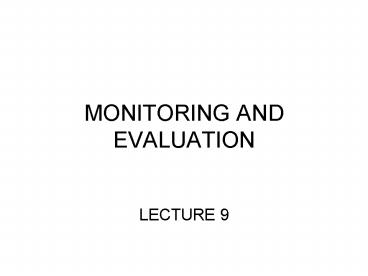MONITORING AND EVALUATION - PowerPoint PPT Presentation
1 / 22
Title:
MONITORING AND EVALUATION
Description:
Analysing a situation. Whether inputs are well utilised. Identifying problems ... Data analysis. Implementing evaluation. Reporting. THE END OF THE COURSE ... – PowerPoint PPT presentation
Number of Views:64
Avg rating:3.0/5.0
Title: MONITORING AND EVALUATION
1
MONITORING AND EVALUATION
- LECTURE 9
2
- WHAT IS MONITORING
- WHAT IS EVELAUTION
- WHEN TO EVALUATE
- HOW TO EVALUATE
- WHAT TO EVALUATE
- WHY EVALUATION
3
What Is Monitoring?
- Making observations of action executed
- Data collected may be in the form of
- Pictures
- Numbers/levels of measures
- Numbers of occurrences
- Etc
- What data to collect is dictated by the plan
4
- Key Elements
- Continuing function or process
- Observation
- Taking note/recording
- Systematic
- Purposeful
- On an undertaking
5
Purpose of Monitoring
- Analysing a situation
- Whether inputs are well utilised
- Identifying problems
- Ensuring activities are carried out properly
6
Tools, Methods, Approaches
- Performance monitoring indicators
- Logical framework
- Formal surveys
- Service delivery surveys
- Citizen report cards
- Living standards measurements surveys (LSMS) e.g.
GLSS I, II, III and IV. - Rapid appraisal methods
- Key informant interviews
- Focus group discussions
- Facilitated brainstorming
7
- Participatory methods
- Public expenditure tracking surveys
8
What Is Evaluation?
- The systematic assessment of information to
provide useful feedback about some object in
order to determine the worth or merit of the
object and identify the reasons for the worth
merit or feedback.
9
- It makes judgement of information in order to
assess value, worth or impact of a project. - Additionally, it looks at the dynamics of
development interventions and identifies the
reasons for both success and failure and how one
can learn from both.
10
Purpose
- Main purpose
- provide useful feed back to stakeholders
- entrepreneurs,
- sponsors,
- donors,
- client-groups,
- administrators,
- staff,
- and other relevant constituencies
11
Types of Evaluation
- There are several types of evaluation.
- The classification is based on
- purpose of the evaluation,
- methodology,
- timing,
- who is involved in the evaluation
- position of the evaluators.
- Based on purpose (Trochim, 2002)
- formative
- summative
12
- Formative evaluation is a method of judging the
worth of a programme or project while the
programme or project activities are forming or
happening. - Formative evaluation focuses on the process
(Bhola 1990) - Aim
- improve or strengthen the programme/project
being evaluated
13
- Achieved by
- examining the delivery of the programme
- technology,
- quality of its implementation,
- the assessment of the organisational context,
- Human resource,
- procedures,
- inputs, and so on.
14
- The types of formative evaluation
- needs assessment,
- evaluability assessment,
- structured conceptualisation,
- implementation evaluation
- process evaluation.
15
- Summative evaluation is a method of judging the
worth of a programme at the end of the program
activities. - The focus is on the outcome (Bhola 1990).
16
- types of summative evaluation
- outcome evaluations,
- impact evaluation,
- cost-effectiveness analysis
- cost-benefit analysis,
- secondary analysis
- meta-analysis
17
- In respect of timing, evaluation can also be
classified - ex ante
- operational or ongoing evaluation
- ex poste evaluation of completed project
18
- By methodology employed
- Quantitative
- Qualitative
19
- Based on the position of the evaluators
- external evaluators
- internal evaluators
20
What to Evaluate
- Outcomes
- Processes
21
- Planning
- Selecting object (setting objectives)
- Methodology
- Deciding on standards
- Choice of measures
- Data collection
- Data analysis
- Implementing evaluation
- Reporting
22
THE END OF THE COURSETHANKS FOR YOUR
ATTENTION.ALL THE BEST IN THE EXAMS.I WISH YOU
A SUUCESSFUL WORK WITH KNOWLEDGE OF PROJECT
MANAGMENT































